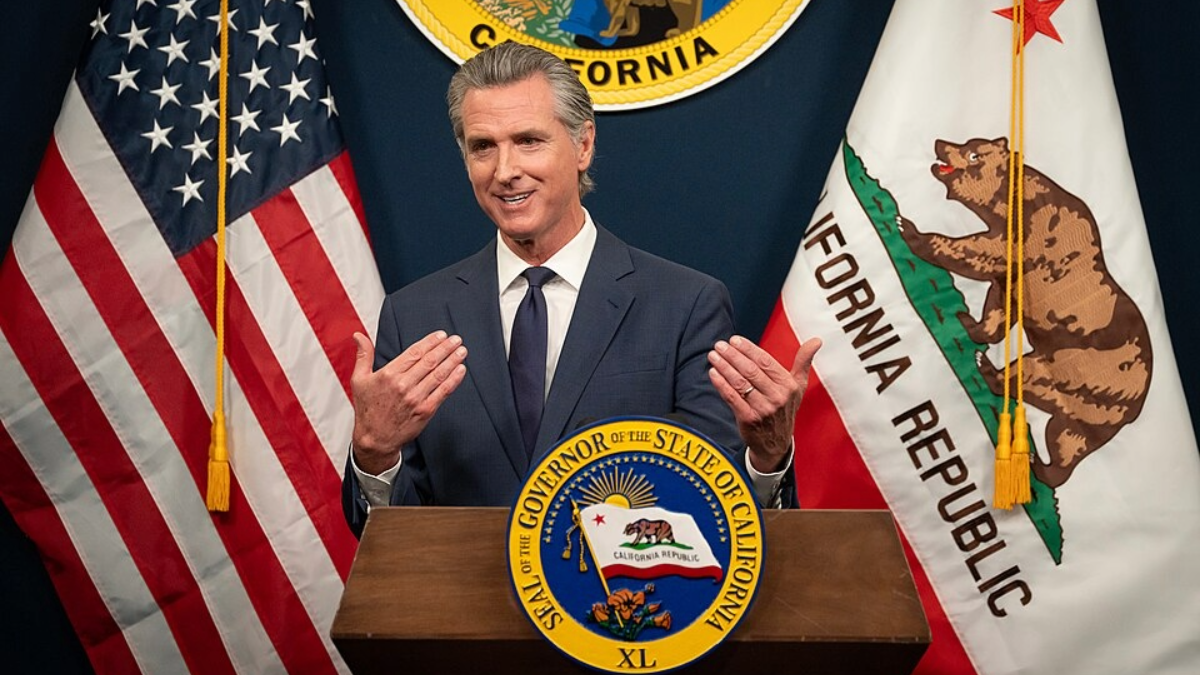Newsom Sides with Tech Lobby in AI Companion Standoff
Cristiano Lima-Strong / Oct 14, 2025
California Gov. Gavin Newsom speaks at a press conference in May. (Office of the Governor of California)
California Gov. Gavin Newsom (D) this week vetoed a sweeping bill to restrict children’s access to artificial intelligence “companions” and signed a narrower measure to boost transparency around the products, largely siding with tech groups who lobbied aggressively on the bills.
California’s legislature last month passed dueling proposals to expand protections around the use of AI companions: AB 1064, also known as the Leading Ethical AI Development (LEAD) for Kids Act, and SB 243.
Children’s safety advocates and groups pushing for more stringent tech regulation championed AB 1064, which would ban companies from making AI companions available to children unless they are “not foreseeably capable” of engaging in certain harmful conduct, such as encouraging young users to commit self-harm or engage in sexual exchanges.
In a veto message released late Monday, Newsom said that while he supported the bill’s intent, it would impose “such broad restrictions on the use of conversational AI tools that it may unintentionally lead to a total ban on the use of these products by minors.”
“We cannot prepare our youth for a future where AI is ubiquitous by preventing their use of these tools altogether,” Newsom wrote.
The remarks echoed criticisms from tech industry groups such as TechNet, CCIA and the Chamber of Progress, which argued in digital ads, op-eds and letters that the bill would impact a broad array of AI tools, including education products, as Tech Policy Press previously reported.
California Assemblymember Rebecca Bauer-Kahan (D), who introduced the measure, said in a statement on Monday that she was “sorely disappointed to see Governor Newsom side with Big Tech” over families who lost their children after they interacted with AI companions.
Common Sense Media founder and CEO Jim Steyer, whose group was a vocal proponent of the measure, said in a statement they are “disappointed that the tech lobby has killed urgently needed kids’ AI safety legislation.” Steyer said Common Sense plans to renew efforts to pass it next year.
TechNet, which counts Meta, OpenAI and Anthropic as members, thanked Newsom for his “thoughtful consideration” and veto of AB 1064 in a statement Monday, adding that the bill “fails to meet its stated objectives while threatening students’ access to valuable AI-driven learning tools, potentially life-saving medical treatments, crisis response interventions, safety mechanisms, and other valuable AI technologies.”
Newsom instead signed into law SB 243, which will require that AI developers give all users clear warning that they are dealing with an AI companion if there is reason to believe they could be misled into thinking they are not. It would also require companies to maintain protocols to prevent harmful material being surfaced to users, with added protections for minors. The law mirrors a similar proposal signed earlier this year in New York.
While several advocacy groups, including Common Sense and the Tech Oversight Project, initially backed SB 243, they withdrew their support just prior to its final passage, arguing that the measure had been weakened during negotiations. One group criticized changes that introduced new exemptions for video games and smart speakers to the bill and delayed implementation requirements.
Newsom’s office had consulted on the latest amendments to the legislation, Tech Policy Press previously reported, citing two people briefed on the matter.
Meanwhile, tech industry groups including CCIA and the Chamber of Progress came to embrace SB 243 as an alternative to the more stringent AB 1064. Other industry groups such as TechNet and the American Innovators Network continued to oppose both measures.
“The safeguards in Senate Bill 243 put real protections into place and will become the bedrock for further regulation as this technology develops,” California State Sen. Steve Padilla (D) said in a statement Monday.
Padilla and Bauer-Kahan had supported one another’s measures and expressed hope that Newsom would sign both into law, an option he ultimately bypassed by vetoing AB 1064.
AB 1064 was also backed by California Attorney General Rob Bonta (D), who last month said the bill would represent a “much needed first step to ensure that our children are not treated as test subjects as AI innovation moves quickly.”
Newsom’s decision marked a significant blow for children’s safety advocates, who in recent years have worked with state officials in Sacramento to advance several watershed online safety measures, including a proposal aimed at making online platforms more “age-appropriate” for kids.
This year they secured Newsom’s signature on a separate measure to place tobacco-style warning labels on social media platforms, AB 65, also led by Bauer-Kahan.
Authors
